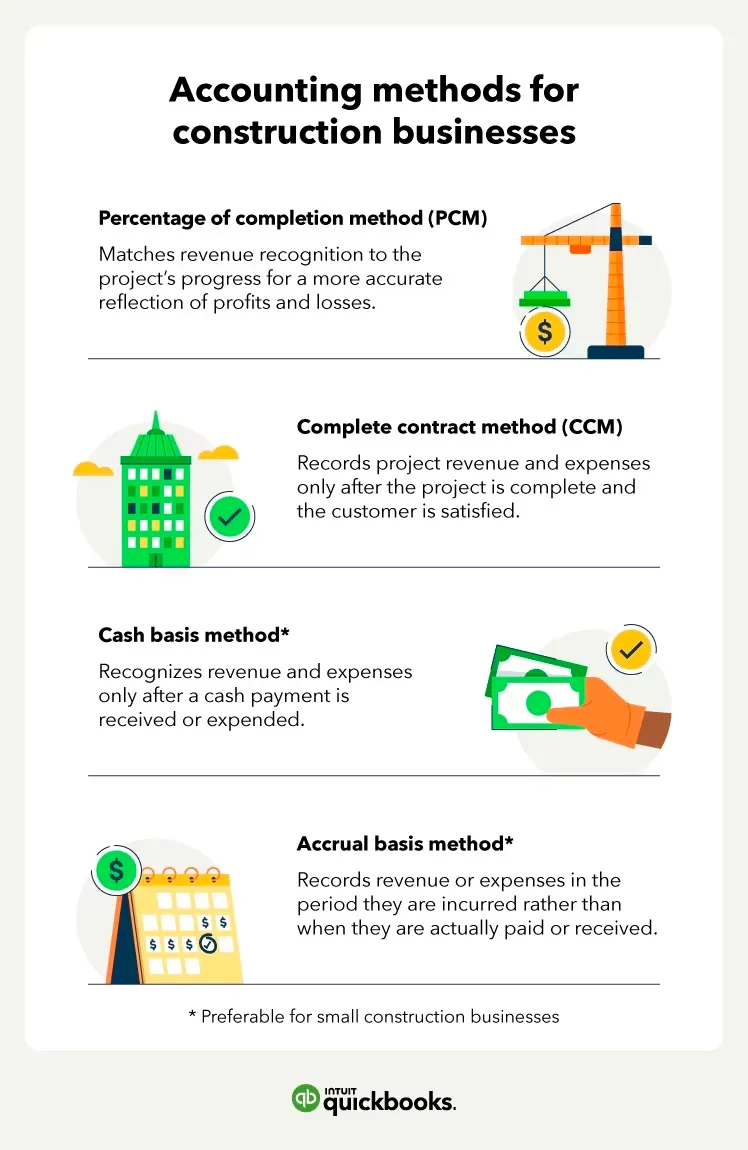Secret Solutions Offered in Building And Construction Accountancy to Enhance Financial Oversight
In the realm of building and construction audit, vital solutions such as task price estimate, budget plan monitoring, and cash money flow analysis play an important function in improving financial oversight. Comprehending these subtleties can considerably influence the efficiency of economic oversight in building projects.
Task Cost Estimate
Reliable job price estimate is a vital part of successful construction bookkeeping solutions, as it directly influences budgeting and monetary preparation (construction accounting). Accurate price price quotes supply a detailed review of the monetary needs for a building task, enabling stakeholders to make informed choices relating to resource appropriation and job expediency
A comprehensive price evaluation process encompasses various aspects, consisting of labor, materials, equipment, overhead, and contingencies. By evaluating historical information and existing market fads, construction accounting professionals can establish practical quotes that show true job prices. This analytical approach not just aids in securing financing however additionally enhances openness and responsibility among all celebrations involved.
In addition, accurate price evaluation functions as a structure for monitoring and managing expenses throughout the job's lifecycle. By developing a clear baseline, building accounting professionals can identify inconsistencies in between estimated and real costs, enabling timely adjustments and interventions.
Inevitably, effective task expense estimation not just assists in smoother project implementation but additionally enhances the overall financial health and wellness of construction businesses, ensuring they remain competitive in an increasingly dynamic sector. This critical strategy emphasizes the importance of proficient professionals in providing reputable and accurate cost estimates.
Budget Monitoring
In the realm of building and construction bookkeeping services, budget management plays a pivotal function in making sure that tasks remain financially feasible and on course. Effective budget plan management includes the systematic planning, tracking, and controlling of job prices to straighten with financial objectives. It begins with the development of a detailed budget plan that accurately shows the anticipated costs of labor, materials, equipment, and expenses based upon extensive project cost estimation.
When the budget is developed, continuous tracking is necessary. This includes regular evaluations of actual expenses versus the allocated numbers, allowing for timely recognition of inconsistencies. By carrying out tools and software program customized for building and construction accounting, project managers can create real-time reports that facilitate educated decision-making.
Moreover, proactive budget plan management makes it possible for stakeholders to adjust financial allotments and resources as essential, promoting flexibility in response to unanticipated obstacles. This adaptability is critical in the building sector, where task ranges can regularly alter. Inevitably, durable budget administration not just bolsters financial responsibility however likewise improves general task efficiency, making sure successful conclusion within the allocated financial criteria.
Capital Analysis
Capital evaluation works as an important component of building bookkeeping, allowing project managers to preserve a clear understanding of the inflow and outflow of funds throughout the project lifecycle. This analytical procedure enables the recognition of possible money lacks or excess, empowering managers to make enlightened choices pertaining to budgeting and resource appropriation.
By diligently tracking money inflows from client settlements, loans, and other profits sources, along with keeping an eye on discharges such as labor, materials, and overhead costs, project supervisors can develop a thorough capital projection - construction accounting. This forecast not just aids in projecting future monetary placements however also helps in determining patterns that may affect task viability
Normal capital analysis facilitates timely interventions, enabling project supervisors to resolve monetary challenges before they intensify. This aggressive approach can reduce dangers linked with delayed payments or unexpected expenses, ultimately bring about even more effective job conclusions. Moreover, effective money flow management adds to maintaining strong connections with subcontractors and distributors by making sure timely settlements.
In significance, money circulation analysis is an essential device in construction accountancy, driving financial security and operational efficiency throughout the period of construction tasks.
Regulatory Compliance Assistance
Regulatory compliance support is necessary for construction companies browsing the complicated landscape of market guidelines and criteria. The building and construction sector goes through a myriad of regional, state, and government policies, including safety and security criteria, labor legislations, and environmental standards. Non-compliance can cause substantial penalties, hold-ups, and reputational damages.
A durable compliance support system assists firms remain informed regarding pertinent laws and makes sure that they implement required policies and treatments. This includes tracking modifications in legislation, supplying training for workers, and carrying out routine audits to examine conformity degrees. Construction accountants play a vital role in this procedure, offering competence to interpret policies and align monetary methods accordingly.
Moreover, governing compliance assistance incorporates the prep work and entry of called for documentation, such as tax obligation filings and reporting for labor standards. By developing a positive compliance method, construction firms can alleviate threats connected with non-compliance, boost operational performance, and foster a society of responsibility.
Ultimately, efficient regulatory conformity support not just safeguards a building company's financial wellness yet also enhances its track record in the sector, positioning it for lasting growth and success.

Financial Coverage and Insights
While browsing the intricacies of the building and construction sector, accurate financial coverage and informative analysis are essential for notified decision-making. Building jobs frequently include substantial capital expense and varying costs, making it important for stakeholders to have accessibility to timely and clear economic information. Comprehensive financial reports, consisting of profit and loss statements, money circulation forecasts, and annual report, provide a snapshot of a company's financial health and performance.
Additionally, tailored understandings derived from these records aid managers identify fads, evaluate project success, and make calculated changes to boost operational effectiveness. Key performance signs (KPIs) details to building and construction-- such as project margins, labor prices, and above ratios-- supply important standards for assessing success and projecting future efficiency.
Furthermore, routine economic reporting makes it possible for conformity with legal commitments and promotes openness with stakeholders and investors. By leveraging advanced accountancy software and information analytics, construction companies can enhance their financial oversight, enabling them to navigate unpredictabilities a lot additional info more effectively. Inevitably, robust monetary coverage and actionable understandings encourage building business to make informed choices that advertise development and sustainability in an extremely open market.
Conclusion

In the world of building and construction audit, crucial solutions such as job cost evaluation, spending plan administration, and cash flow evaluation play a vital function in enhancing financial oversight. Eventually, robust budget plan monitoring not only reinforces financial accountability but also enhances total task efficiency, making sure successful conclusion within the designated financial criteria.

Comments on “Construction Accounting: How to Keep Your Projects Profitable and Financially Stable”